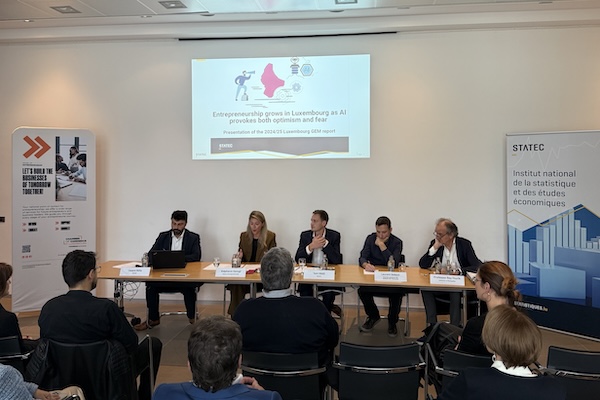 Credit: Ievgenii Karanov, Chronicle.lu
Credit: Ievgenii Karanov, Chronicle.lu
On Thursday 16 October 2025, Luxembourg’s national statistics institute STATEC presented the 2024/25 Luxembourg Global Entrepreneurship Monitor (GEM) report at the House of Entrepreneurship in Luxembourg-Kirchberg.
Noted under the theme “Entrepreneurship grows in Luxembourg as AI provokes both optimism and fear,” the event featured contributions from Tom Haas, Director of STATEC, Aileen Ionescu-Somers, Executive Director of GEM, Professor Roy Thurik of the University of Montpellier, Laurent Solazzi of the Directorate General for SMEs, Ministry of the Economy and Stéphanie Damgé, Director of the House of Entrepreneurship.
Tom Haas underlined the value of GEM for policy-making, noting that growth is not linear but driven by creative disruption and the microdynamics of entrepreneurship. “We cannot fully understand growth if we only look at snapshots and averages. GEM listens to many individual entrepreneurs and shows what drives or hinders them,” he said, calling it “a window into the future of our economy.”
Stéphanie Damgé said GEM offers more than headline figures, helping track key indicators, compare Luxembourg with peers and identify levers to boost competitiveness. “GEM gives a voice to current and aspiring entrepreneurs, showing intentions, barriers and the drivers that turn ambitions into projects,” she noted.
Joining online, GEM Executive Director Aileen Ionescu-Somers said GEM has grown since 1999 into the world’s most comprehensive entrepreneurship research project. She highlighted its two annual surveys, the Adult Population Survey and the National Expert Survey, which provide primary comparative data on entrepreneurs and benchmark the quality of the entrepreneurial context to inform policy.
Professor Roy Thurik focused on evidence for entrepreneurship’s role in growth while stressing context and policy design. “Entrepreneurship is good for economic growth, but the relationship is complex and depends on context,” he said, adding that democracy and institutional quality may shape outcomes. He also called GEM “one of the most important research endeavours for entrepreneurship policy,” and urged Europe to build scale and independence in scientific discovery.
Cesare Riillo, Senior Economist at STATEC Research, presented the main findings of the 2024/25 Luxembourg GEM report.
In 2024, early-stage entrepreneurial activity (TEA) in Luxembourg rose to 9.9% of the adult population, up from 7% in 2022 and slightly above the European average by 0.7 percentage points. The fear of failure fell to 41% among those seeing good opportunities, the lowest level recorded in Luxembourg. At the same time, 44% of entrepreneurs reported lower growth expectations than a year earlier.
GEM collected views on artificial intelligence for the first time: 34% of TEA entrepreneurs considered AI very important to their business, ranking Luxembourg first in Europe. 68% expected AI to boost productivity and efficiency, while 58% were concerned about data security and privacy.
On sustainability, 54% of entrepreneurs said they actively worked to minimise environmental impact, and 66% to maximise social impact, placing Luxembourg at the top of the cross-country ranking.
The report notes a low rate of necessity-driven entrepreneurship (39% versus an EU average of 57%). The gender gap widened in 2024, with 6.4% of women versus 13.3% of men in TEA (2023: 8.7% vs 10.6%). Immigrants showed a higher propensity to start businesses (11.7%) than natives (7%).
Entrepreneurs most often cited affordable office space, human resources and funding as key constraints. Special topics for GEM 2025/2026 will cover trade and tariffs and sources of financing.
The full report is available on STATEC’s website: https://statistiques.public.lu/en/actualites/2025/gem-report-2025.html









